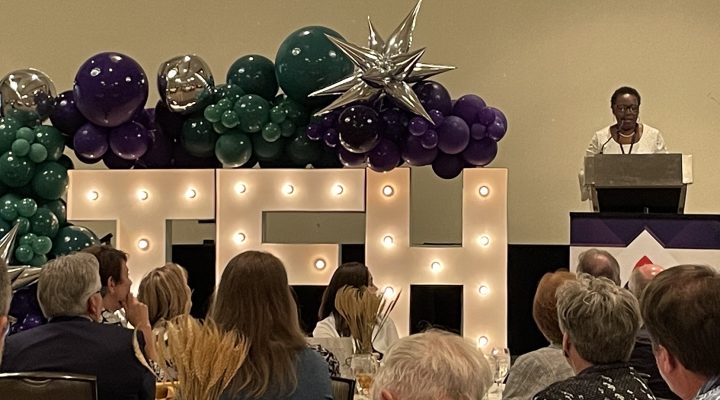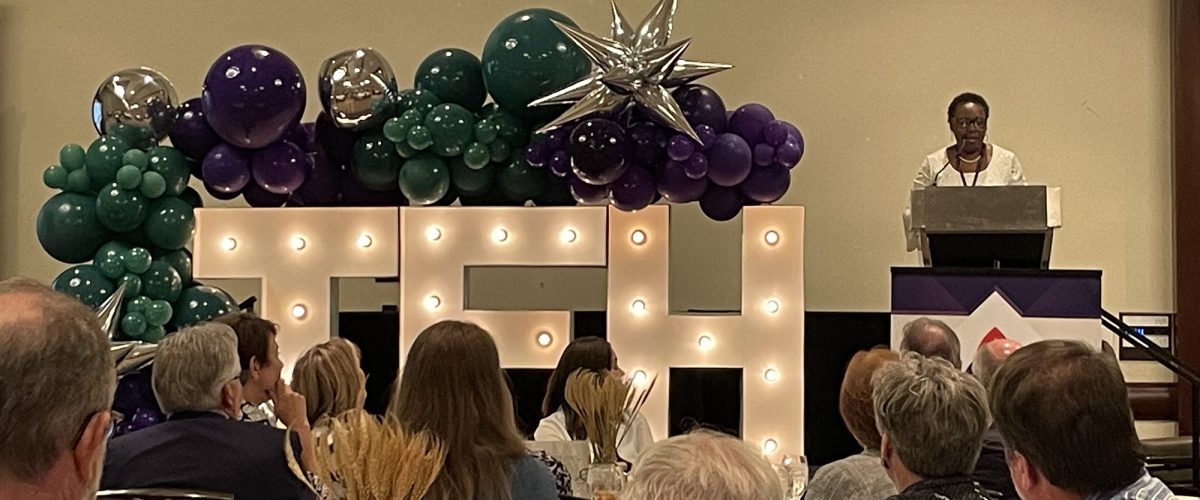The mayor of Sidon, Miss., said courage surged through her town when it encountered Together for Hope, a national coalition that uses holistic approaches to fight poverty in the most economically ravaged American communities.
Like most cities and towns in the Delta region, Sidon had been abandoned long ago by factories and businesses, destroying the local economy and educational system in the process. But a plan for hope emerged with a visit from Together for Hope President Jason Coker and Delta Vice President Nicole Stringfellow, Mayor Johnnie Neal said during Together for Hope’s June 29 celebration banquet at the Hyatt Regency in downtown Dallas.
“We realized we had businesses within our town we had never knew we had. It lit a fire in me. It increased the morale of Sidon,” she said at the dinner held in conjunction with the Cooperative Baptist Fellowship’s General Assembly.
“We realized we had businesses within our town we had never knew we had. It lit a fire in me.”
Helping the community see its assets and potential has infused Sidon with renewed purpose, Neal said, noting Together for Hope has been “God ordained and a blessing for my town.” Residents’ eyes have been opened to the previously unseen and untapped resources the small community possesses.
Helping communities suffering from generational poverty is Together for Hope’s mission, said Coker, who grew up in the Mississippi Delta. “We fight poverty, and we support labor.”
But the independent nonprofit that began as a CBF ministry in 2001 does not swoop in to rescue communities by solving their problems for them, he explained. Instead, the coalition utilizes an asset-based community development model that inspires residents to identify and capitalize on the gifts and talents already present in their neighborhoods.
That’s drastically different from the typical needs-based approach employed by governments and many granting organizations to address poverty, Coker said. “A needs assessment can be a pretty terrible thing” because it requires already suffering towns to dwell on the negatives, including crime and dropout rates. “We don’t do that. We go in and say, ‘What do you have?’”
That approach — and its outcome — are surprising to participants in most cases, Coker added. “We always hear, ‘We forgot how much we had.’ But as long as you have people, you have assets.”
Together for Hope applies its approach in 339 U.S. counties designated as centers of persistent rural poverty, communities where at least 20% of the population has lived below the federal poverty line for 30 or more years.
Together for Hope applies its approach in 339 U.S. counties designated as centers of persistent rural poverty, communities where at least 20% of the population has lived below the federal poverty line for 30 or more years. Those communities are located in the Delta, the Black Belt stretching through the American South through Appalachia, the Rio Grande Valley and Native American territories in northeast Arizona and South Dakota. Together for Hope and its partners focus on improvements in education, health and nutrition, housing and environment and social enterprise.
Advocacy is another key activity. The organization seeks to bust the myth that people living in poverty are lazy. In fact, poverty affects children and elderly the most, not those of working age who are typically blamed, Coker said.
What’s more, generational poverty is driven not by the avoidance of labor, but by the absence of it thanks to federal and state policies and the abandonment of rural America by industry, he said.
Residents are then trapped in areas without enough schools, grocery stores or employers, resulting in education, food and employment deserts, Coker said. People are forced to travel long distances for education, sustenance and low-paying jobs they can’t afford to miss. “If they lose a tire, they lose a job.”
Tiffany Terrell, co-founder of A Better Way Grocers in Albany, Ga., illustrated the way in which Together for Hope comes alongside and assists existing local efforts to help those in need.
Her ministry, which uses a converted school bus to deliver fresh food to rural seniors and others experiencing hunger, was struggling with government red tape when Together for Hope’s Rachel Gunter Shapard reached out to connect her to the network. A Better Way Grocers has since expanded into an adjacent county and more growth is imminent.
That’s how Together for Hope works, Coker added. “We look for the good people and work with them and put them in a coalition.”
Related articles:
Coker named to elite futurism cohort, benefiting Together for Hope
If you want to help the poor, first understand their humanity
Three-state merger hailed as transformative by CBF leaders
Delta-bred Coker returns home from New England to lead Mississippi CBF


